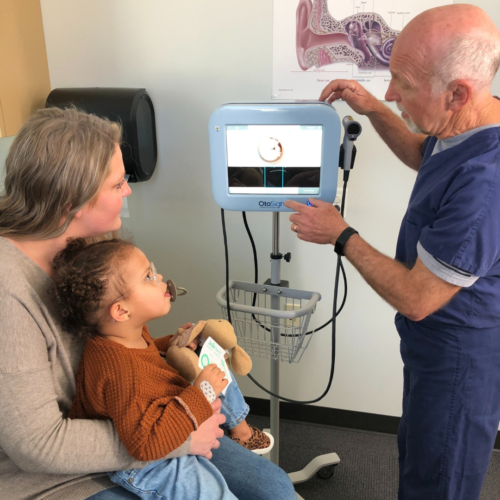Phone
866-411-EARS
Address
PhotoniCare Inc.
2800 Meridian Parkway, Suite 175
Durham, NC 27713

This week on the #EnginEarGuys blog we talk about otolaryngology – one of the oldest medical specialties in the United States. We also share when it is important to see one, especially as it relates to dealing with persistent ear infections.
Otolaryngology (pronounced oh/toe/lair/in/goll/oh/jee) is the specific medical and surgical treatment and management of patients that struggle with ear, nose, throat and related disorders of the head and neck. We often refer to otolaryngologists as ENT (Ear, Nose, and Throat) doctors because it’s easier to say than otolaryngologist. They treat children and adults with a wide range of disorders, including ear disease (like otitis media or middle ear infections), hearing loss, nasal and sinus problems, throat problems, and tumors in the head and neck.
Physicians that go on to become ENT specialists complete upwards of six years of specialized surgical training beyond medical school. To qualify for certification by the American Board of Otolaryngology, an applicant must first complete college and medical school, and have at least five years of ENT specialty training after that. Then one must successfully pass the American Board of Otolaryngology license exam, followed by fellowship for more extensive training in one of eight subspecialty areas. These areas include allergy, facial plastic and reconstructive surgery, head and neck, laryngology (throat), otology/neurology (ears, balance, and tinnitus), pediatric otolaryngology, rhinology (nose), and sleep disorders.
PhotoniCare works with a number ENT specialists, specifically pediatric ENTs, on a variety of our research and development efforts. Children are more prone to ear infections than adults. Therefore we work with pediatric ENTs to study and better develop how our technology can make a more positive impact on diagnosis and treatment of ear infections.
Patients are often referred to an ENT specialist in order to treat disorders of the ears, nose, throat, and related structures of the head and neck. Different than other physicians, these specialists are trained in both medicine and surgery. Patients commonly referred to ENTs include those that suffer from recurring ear infections and may be candidates for ear ventilation tube surgery. An ear tube is used most often to provide long-term drainage and ventilation to middle ears that have had persistent fluid buildup, chronic middle ear infections, or frequent infections.

The COVID-19 pandemic has created numerous challenges for parents. Navigating… Read More

PhotoniCare sits down with Dr. Michael Novak, an Ear, Nose… Read More

For some children, ear infections seem unavoidable. With the cold… Read More